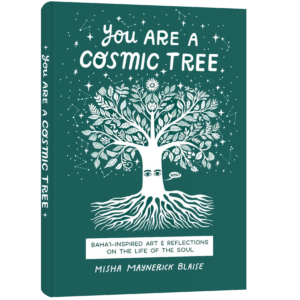
The Bahá’í Publishing Trust: Producing classics for a new era

The production and distribution of Bahá’í literature has been at the heart of the Faith since its emergence in the mid-1800s. In the days of Bahá’u’lláh, the revealed word of the Manifestation was recorded by hand by His amanuensis and then carefully checked for accuracy in His presence before being transcribed meticulously and dispatched for delivery to the intended recipients.
Throughout Bahá’u’lláh’s years in exile, these sacred verses were delivered from His presence to the towns and villages of Persia—often by one man, Shaykh Salmán, who frequently made the journey on foot and who seemed to live permanently on the road, navigating the many dangers associated with such travel. Salmán was said to be illiterate, but was endowed with deep wisdom and had methods for determining which Tablet was intended for which person. Repeatedly traversing the distance between Bahá’u’lláh and the scattered believers over several decades, he delivered the Tablets and returned with messages and letters from the friends. Salmán is just one example of the many souls who devoted themselves to the dissemination of the Holy writings during the early years of the Faith.1
As the Faith grew, so too did its literature and the mechanisms for its production and dissemination. Bahá’í literature in the United States has its roots in the time of ‘Abdu’l-Bahá and the efforts of early American believers such as Thornton Chase and Albert Windust, among others.2 In the early 1900s, the Baha’i Publishing Society was established, producing early translations of the sacred texts as well as books about the Faith and its principles. The first volumes of The Bahá’í World and the publication of Star of the West grew out of these efforts. ‘Abdu’l-Bahá noted the significance of these achievements in His Tablet to the Bahá’ís of the Central States.3
These fledgling steps gained momentum under the direction and encouragement of Shoghi Effendi and in 1955, the National Spiritual Assembly of the United States established the US Bahá’í Publishing Trust.
The Publishing Trust publishes and distributes Bahá’í literature and other related items that “support the all-important work of teaching and study of the Cause”4 as well as serving “the wider needs of the American Bahá’ís.”5
The Publishing Trust is a nonprofit business that functions under the aegis of the National Spiritual Assembly. It offers its products and services at the lowest price compatible with a befitting presentation, the maintenance of the value of the capital investment, and the accumulation of sufficient funds to sustain the business.
Today, the Publishing Trust produces materials under three distinct publishing imprints:
Bahá’í Publishing is the primary imprint through which books are produced for an adult audience. These include the sacred and authoritative texts of the Faith, histories and biographies, introductory materials, books that present a Bahá’í perspective on social issues or contribute to social discourse, and books that illustrate a Bahá’í approach to social action.
Bellwood Press produces books aimed at children, junior youth, and youth. Bellwood books include fiction and nonfiction titles, and explore Bahá’í teachings and history, reinforce Bahá’í identity, and support individual spiritual development and the practical application of Bahá’í principles.
One Voice Press is a trade publishing imprint for titles less directly associated with the Faith. These are Bahá’í-inspired books with a focus on spiritual principles in action.
Regardless of the imprint, the Publishing Trust’s intent is to support the work of the Nine Year Plan and the publication needs at the grassroots of the community building process taking shape throughout the country.
Anyone wishing to submit their work for the consideration of the Publishing Trust is welcome to do so. Information about the submission process can be found here. at https://www.bahaibookstore.com/About-Us.aspx. Manuscripts can be sent directly to the editorial department. at: acquisitions@usbnc.org. All manuscripts received are read and carefully evaluated with several factors taken into consideration, including the subject matter and how well it serves the current plan and the needs of the community; the quality and readability of the work; the soundness of its research and claims; and the work’s marketability. All manuscripts accepted for publication must also be reviewed and approved by the Review Office of the National Assembly to ensure that accuracy and appropriate dignity are maintained with any matters related to the Faith.
If a project is accepted for publication, a contract is offered to the author, and a process is initiated that includes editorial work done in close collaboration with the author; production and design; and ultimately print, publication, distribution, and marketing.
The staff of the Bahá’í Distribution Service (BDS) works to make sure that the books are accessible to a wide a range of customers through the Bahaibookstore.com website; the mobile app; and, for books identified as trade titles for the general public, through the trade distributor Independent Publishers Group (IPG), which feeds the books to outlets such as Amazon and other commercial retailers.
There is an ever-expanding catalog of work—including print titles, e-books, and audiobooks—available at BDS from the Publishing Trust, other Bahá’í publishers, and independent authors. Bahá’ís and their friends are encouraged to engage with the literature, to make use of it within their communities and neighborhoods, and even to consider contributing their own voices to it as authors.
Visit BahaiBookstore.com to learn more.
The Bahá’í Publishing Trust recently released YOU ARE A COSMIC TREE, a visual exploration of the life of the soul. Author and illustrator Misha Maynerick Blaise shares some thoughts on how the book came to be.

Please tell us a little about your creative process.
I’m drawn to the concept of the hero’s journey, a framework of adventure and transformation that reflects the deepest longings and fears of the human experience. Similar motifs are found in the Bahá’í Writings, for example Bahá’u’lláh’s mystical schema of the soul’s development described in The Seven Valleys. Life is a call to adventure, and each one of us will inevitably confront the mysteries, difficulties and paradoxes inherent on that journey.
The Bahá’í Writings say that the purpose of religion is spiritual transformation. Obviously, spiritual transformation doesn’t come from just memorizing the “right” answers or knowing a cool set of beliefs. We are invited, rather, to mine the depths of the soul for inner treasures and virtues that can be expressed in the outer world. The institute process can be an awesome catalyst for transformation. While it offers a certain amount of structure, to thrive it requires creativity, beauty, friendship and love, all qualities that we bring forth from the soul. My book explores the mystical connection with God that’s at the heart of our spiritual development and our service in the world.

Your book touches on some pretty deep topics, yet you have managed to infuse it with humor and lightness. How did you do this?
I think humor can open the heart and create a sense of connection. It can remove barriers of fear or defensiveness when exploring something new. My book delves into somewhat difficult subjects like suffering, identity and the chaos of the era we are living in. I tried to use art and comic relief to promote a sense of curiosity in the ideas I’m presenting and increase relatability. Also, I think it’s soothing to have a laugh about the universal challenges we all face. It makes us feel less alone.

Even with the wide variety of drawings, you have a distinctive style that shines throughout. How did you develop and hone this style?
This is the seventh book I’ve written and illustrated, but it was the first time I’ve ever illustrated in black and white. To be honest, this was a difficult choice because it comes with its own set of challenges and limits.
When I was in my late teens and twenties, “zines” were popular in some circles. They are basically little pamphlet-like books that you make yourself, at that time with a self-serve copying machine. It’s a creative and fun way to share your thoughts about the world with friends. I had the concept of the zine in mind when I designed this book. It’s something to pick up, feel inspired by, and share around. Even though it’s filled with deep ideas, it’s also something to not take too seriously. I hope the black and white images and handwritten text bring a more casual vibe, but also invite a sense of wonder and delight, which are good things to feel when you are contemplating the life of the soul.




